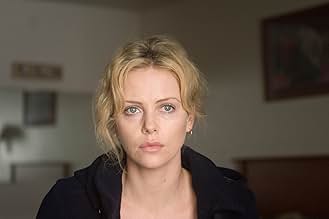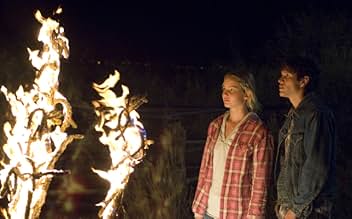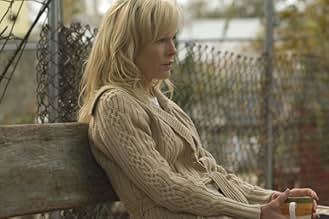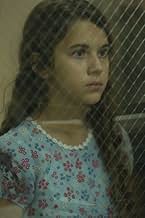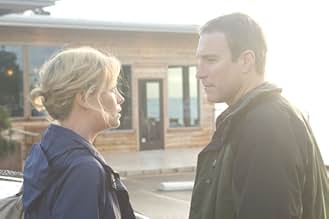VALUTAZIONE IMDb
6,7/10
21.772
LA TUA VALUTAZIONE
Film drammatico con trama a due livelli riguardante una mamma e una figlia che cercano di creare un legame in seguito alla difficile infanzia vissuta dalla giovane.Film drammatico con trama a due livelli riguardante una mamma e una figlia che cercano di creare un legame in seguito alla difficile infanzia vissuta dalla giovane.Film drammatico con trama a due livelli riguardante una mamma e una figlia che cercano di creare un legame in seguito alla difficile infanzia vissuta dalla giovane.
- Regia
- Sceneggiatura
- Star
- Premi
- 2 vittorie e 3 candidature totali
Diego J. Torres
- Cristobal
- (as Diego Torres)
Rosalia De Aragon
- Aunt Rebecca
- (as Rosalia de Aragon)
Recensioni in evidenza
The movie reminded me of Babel, which is not that crazy since Arriaga wrote and directed Babel together with Alejandro González Iñárritu. (I only found this out after I saw The Burning Plain). Whereas I thought Babel was good but not superb, I absolutely loved The Burning Plain. just like Babel, The Burning Plain doesn't do chronology and I love the way Arriaga uses the lack of a chronological time-line to put you on a sidetrack time and time again. Of course I suspected things but I completely missed one of the biggest twists. Past and present are so mixed up that it isn't until quite far into the movie that you realise how all the characters are connected. And in this connection you'll find the big difference between the two movies. Whereas Babel shows the stories of people that are only connected by coincidence, The Burning Plain goes much further than that. When, almost in the end, you find out what really happened you cannot but acknowledge the genius of the person who wrote the story and the stylish way the movie was directed.
Once the 'big twist' is revealed it was like an 'aha-Erlebnis'. From beginning until ending you are wondering about the connections between the characters. "What does Sylvia have to do with Mariana and Santiago, or with Gina and Nick"? When eventually you find out, it is like a puzzle with the last piece falling in place. The result is a beautiful picture with a sad undertone, but not one I would have wanted to miss.
Once the 'big twist' is revealed it was like an 'aha-Erlebnis'. From beginning until ending you are wondering about the connections between the characters. "What does Sylvia have to do with Mariana and Santiago, or with Gina and Nick"? When eventually you find out, it is like a puzzle with the last piece falling in place. The result is a beautiful picture with a sad undertone, but not one I would have wanted to miss.
The Burning Plain (2008)
Following a growing trend toward taking a straight forward story and making it complicated by telling it out of order, The Burning Plain might have shown the fault lines in that method. And it's not that the story, a kind of Romeo and Juliet with child story, isn't riveting. It is. And it's not that the telling of it isn't interesting. It is. But the telling is so forcefully complicated, it draws attention to itself, and away from the more human drama that is at work.
That said, it's also true that every high point here there is a storytelling gaffe. The cross cultural Mexican/American themes are generally underplayed (the exception being the insults thrown at the funeral), and convincing. The basic love story is strong enough, too, and given a nice second layer through time, as you'll see. But there are some quirks that are made both improbable and overly dramatic. One of the tenderhearted heros of the story is shown too visibly as a disturbed stalker. And the lead woman, played with a kind of virtuosic exuberance as usual by Charlize Theron, has almost too much to juggle, emotionally and literally. It just doesn't wash.
Most troubling is the writing. Not the big picture, the plot and the large sequence of events, but the actually dialog. This kind of gritty and dire movie laced with real love has to be convincing above all, and there are dozens of moments and individual lines that just smack as screen writing rather than real characters thinking and speaking.
So it's a mixed bag. An ambitious and promising mixed bag, with some moving and beautiful moments. I think it's worth seeing, but with tolerance.
Following a growing trend toward taking a straight forward story and making it complicated by telling it out of order, The Burning Plain might have shown the fault lines in that method. And it's not that the story, a kind of Romeo and Juliet with child story, isn't riveting. It is. And it's not that the telling of it isn't interesting. It is. But the telling is so forcefully complicated, it draws attention to itself, and away from the more human drama that is at work.
That said, it's also true that every high point here there is a storytelling gaffe. The cross cultural Mexican/American themes are generally underplayed (the exception being the insults thrown at the funeral), and convincing. The basic love story is strong enough, too, and given a nice second layer through time, as you'll see. But there are some quirks that are made both improbable and overly dramatic. One of the tenderhearted heros of the story is shown too visibly as a disturbed stalker. And the lead woman, played with a kind of virtuosic exuberance as usual by Charlize Theron, has almost too much to juggle, emotionally and literally. It just doesn't wash.
Most troubling is the writing. Not the big picture, the plot and the large sequence of events, but the actually dialog. This kind of gritty and dire movie laced with real love has to be convincing above all, and there are dozens of moments and individual lines that just smack as screen writing rather than real characters thinking and speaking.
So it's a mixed bag. An ambitious and promising mixed bag, with some moving and beautiful moments. I think it's worth seeing, but with tolerance.
This is a strange movie. If your a fan of the Babel or other work by Guillermo Arriaga, then you will be satisfied with this movie. If your a fan of Charlise Theron then you be satisfied with this movie. If your looking for a gripping drama about how a tragedy affects the lives of different people you will be satisfied. However, if you looking for a good intense drama, this movie will leave you unsatisfied unless you can get over the very disjointed beginning and follow the movie to the end.
I think you have to be familiar with Arriaga's films to really like this movie. He weaves stories together without any thought of a time line and it can make a movie seem very strange. However, if you will follow this movie to the end, it is a good movie. The Acting especially by Theron is outstanding. Give this movie a chance and its enjoyable. Not a masterpiece, but enjoyable.
I think you have to be familiar with Arriaga's films to really like this movie. He weaves stories together without any thought of a time line and it can make a movie seem very strange. However, if you will follow this movie to the end, it is a good movie. The Acting especially by Theron is outstanding. Give this movie a chance and its enjoyable. Not a masterpiece, but enjoyable.
The pace of the film (probably due to poor editing) is inconsistent. The first half of the film is engrossing, but the second half can be easily predicted. A lot of scenes of the second half can be edited out. Apart from the poor editing, the story itself and the way the story was told are intriguing. The film is women centric and portrays many issues concerning women: breast cancer, housework/chores, mother-daughter relationship, postnatal depression etc.. Charlize Theron suits the leading role particularly after her outstanding performance in the film Monster. But there again exists inconsistency of her appearance in the film (probably due to make-up/lighting filming) - sometimes she appears younger and sometimes older. It's understandable as the director's debut, but I think the director needs to work harder in order to coherently deliver an engaging and technically sound film.
Cause harm repeatedly to most parts of the body and they eventually grow desensitised, calloused and indifferent to the pain over time. This dispassionate, earthy and very dry aesthetic that film-maker Guillermo Arriaga applies to the world of his first major directorial outing is king; between the barren desert landscapes that permeate within the backdrops of his strangely distant and out-of-sync characters and the sparse narrative that intertwines it all together, The Burning Plain views life as a series of scars—cold and unrepresentative of the pain that brought them to the surface, but a firm reminder as such that nothing ever quite goes away, no matter how far you run. For the characters of Arriaga's story, a central catastrophe of sorts serves as the unfortunate catalyst that will bring them all together whether they like it or not. A burning trailer, housing two lovers sharing a passionate affair behind their families back, exploding in a rage of flames seemingly caused by accident. For them, the movie opens with their death thus absolving them from living with their irrevocable actions, but for those they leave behind the past stays as a constant and dictates largely how each of their futures will develop.
Serving as a somewhat humbled character piece that centres on a small group of intertwining stories between the two conflicted families, The Burning Plain is an unassuming and dry landscape of drama. For the majority of the feature, the movie is split between three narratives, most of which take place over different timelines told in a back-and-forth manner which informs but never confuses the viewer as to where each of these characters are going, and where they have been. This multi-layered and contorted style that Arriaga implements here can obviously get a little confusing at times, yet enough care is taken to allow each of the stories to have their own breathing room. As a result, the characters which take centre stage feel nicely developed and human—something integrally important to a story such as Arriaga's. In the end, while it seems that some plot developments never seem to be heading to any sort of meeting point, there exists a sort of catharsis and closure to the movie that ties everything together nicely, but perhaps too nicely. The ending is somewhat dubious, but nevertheless feels like the logical step when taken in retrospect.
As mentioned in the opening paragraph, a central theme to Arriaga's feature here is the suppression of emotion—of a cool, collected and strangely alien approach to relationships with other people. While there are plenty of moments where the director opts to balance such instances out with moments of palpable passion (most of which occur between the two burning lovers), the dominant motif here is that callous and introverted sense of misdirection and ambivalence that plays such a major part in a few of the central characters' stories. The performances then, which can be hard to grasp on to as a result, nevertheless do well to keep things human without ever sacrificing that uniquely cold tone. This isn't a feature that will immediately grasp you with its story or characters, and the performances from the cast are very much the same. Instead The Burning Plain opens up as it goes along, eventually climaxing in a series of finely performed expulsions of emotion. It is in this final act that much of Arriaga's story comes together and pieces fall into place, so it's appropriate that much of the movie's most cathartic, and warmer shades transpire here.
For The Burning Plain to truly come off the screen however, one has to feel for the characters that dominate the screenplay from the get-go, which unfortunately is not the case. While it is certainly evident that Arriaga's crafts an interesting and somewhat unique presentation to an otherwise familiar story thanks to his callous approach to much of the proceeding drama, the movie too often falls a little short of its intended destination thanks to the overly cold opening and unsurprising ending. The result is a feature which definitely succeeds in offering two hours of finely plotted drama, but which also fails at making any more of an impression. The characters are compelling in their own strange way, the narrative complicated but not to the extent that all hope is lost—for those two elements alone I could recommend The Burning Plain to viewers and that's not even taking into account the performances and imagery in twine. In the end however, Arriaga doesn't quite reach where he tries to; The Burning Plain is and enjoyable and rewarding experience, but it lacks the extra zest needed to carry it on through to something more profound and memorable.
Serving as a somewhat humbled character piece that centres on a small group of intertwining stories between the two conflicted families, The Burning Plain is an unassuming and dry landscape of drama. For the majority of the feature, the movie is split between three narratives, most of which take place over different timelines told in a back-and-forth manner which informs but never confuses the viewer as to where each of these characters are going, and where they have been. This multi-layered and contorted style that Arriaga implements here can obviously get a little confusing at times, yet enough care is taken to allow each of the stories to have their own breathing room. As a result, the characters which take centre stage feel nicely developed and human—something integrally important to a story such as Arriaga's. In the end, while it seems that some plot developments never seem to be heading to any sort of meeting point, there exists a sort of catharsis and closure to the movie that ties everything together nicely, but perhaps too nicely. The ending is somewhat dubious, but nevertheless feels like the logical step when taken in retrospect.
As mentioned in the opening paragraph, a central theme to Arriaga's feature here is the suppression of emotion—of a cool, collected and strangely alien approach to relationships with other people. While there are plenty of moments where the director opts to balance such instances out with moments of palpable passion (most of which occur between the two burning lovers), the dominant motif here is that callous and introverted sense of misdirection and ambivalence that plays such a major part in a few of the central characters' stories. The performances then, which can be hard to grasp on to as a result, nevertheless do well to keep things human without ever sacrificing that uniquely cold tone. This isn't a feature that will immediately grasp you with its story or characters, and the performances from the cast are very much the same. Instead The Burning Plain opens up as it goes along, eventually climaxing in a series of finely performed expulsions of emotion. It is in this final act that much of Arriaga's story comes together and pieces fall into place, so it's appropriate that much of the movie's most cathartic, and warmer shades transpire here.
For The Burning Plain to truly come off the screen however, one has to feel for the characters that dominate the screenplay from the get-go, which unfortunately is not the case. While it is certainly evident that Arriaga's crafts an interesting and somewhat unique presentation to an otherwise familiar story thanks to his callous approach to much of the proceeding drama, the movie too often falls a little short of its intended destination thanks to the overly cold opening and unsurprising ending. The result is a feature which definitely succeeds in offering two hours of finely plotted drama, but which also fails at making any more of an impression. The characters are compelling in their own strange way, the narrative complicated but not to the extent that all hope is lost—for those two elements alone I could recommend The Burning Plain to viewers and that's not even taking into account the performances and imagery in twine. In the end however, Arriaga doesn't quite reach where he tries to; The Burning Plain is and enjoyable and rewarding experience, but it lacks the extra zest needed to carry it on through to something more profound and memorable.
- A review by Jamie Robert Ward (http://www.invocus.net)
Lo sapevi?
- QuizIn a 2008 interview, Charlize Theron said taking her clothes off in front of cameras in this and any other film is is as easy as drinking for her. "I don't really think about it much. I read the scene and if it makes sense I do it. I treat it the same way as I would any other scene. Whether it's a nude moment or sitting at a bar drinking, it's all choices. I don't think about it as nudity."
- BlooperIn the airborne scene of the crop duster dusting the field, the course and actions of the dusting process were inconsistent with real crop dusting. Spraying began at a point well into the field, and no distinct pattern was set such as to avoid missing or re-spraying spots.
- Versioni alternativeThere are two versions. Runtimes are: "1h 47m (107 min)" for the theatrical release, and "1h 51m (111 min) (Toronto International) (Canada)".
- Colonne sonoreFalling Star
Written by Ali Dee (as Ali Theodore), Henry Hey, Alana Da Fonseca (as Alana da Fonseca),
Zach Danziger (as Zach Denziger)
Performed by E. Wilson
Courtesy of DeeTown Entertainment
I più visti
Accedi per valutare e creare un elenco di titoli salvati per ottenere consigli personalizzati
- How long is The Burning Plain?Powered by Alexa
Dettagli
Botteghino
- Budget
- 20.000.000 USD (previsto)
- Lordo Stati Uniti e Canada
- 200.730 USD
- Fine settimana di apertura Stati Uniti e Canada
- 58.749 USD
- 20 set 2009
- Lordo in tutto il mondo
- 5.642.478 USD
- Tempo di esecuzione1 ora 47 minuti
- Colore
- Mix di suoni
- Proporzioni
- 2.35 : 1
Contribuisci a questa pagina
Suggerisci una modifica o aggiungi i contenuti mancanti

Divario superiore
By what name was The Burning Plain - Il confine della solitudine (2008) officially released in India in Hindi?
Rispondi


